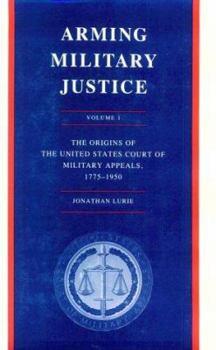Arming Military Justice, Volume I: The Origins of the United States Court of Military Appeals, 1775-1950
(Book #1 in the History of the United States Court of Military Appeals Series)
Why must military justice be different from civilian justice? How different should it be? And to what extent should it be influenced or administered by civilian participants? These are the broad topics addressed by Jonathan Lurie's comprehensive history of the development of appellate review of military justice in the United States. Predating federal district courts by more than a decade, the courts-martial established by the Continental Congress in 1776 were among the first tribunals authorized by the United States. Lurie tells the story of how Congress finally created a civilian appellate court, the Court of Military Appeals, to sit at the top of this military justice system. Why it chose to do so in 1950, with the enactment of the Uniform Code of Military Justice, rather than at an earlier date, is a central theme of his book. Drawing from original sources never before utilized in such a work, Lurie focuses on the political dynamics of the major reforms of military justice that followed World War I and World War II. Other background chapters, however, discuss several earlier episodes that demonstrate tension between civil and military justice. One involved the irascible Andrew Jackson and the legal problems resulting from his enforcement of martial law in New Orleans; a second, the court-martial and execution at sea of three Navy crewmen, among whom was the son of the then Secretary of War A companion volume will treat the legal history of the Court of Military Appeals from 1951 to approximately 1980.
Format:Hardcover
Language:English
ISBN:0691069441
ISBN13:9780691069449
Release Date:June 1992
Publisher:Princeton University Press
Length:300 Pages
Weight:1.36 lbs.
Dimensions:1.0" x 6.4" x 9.6"
Customer Reviews
0 rating





